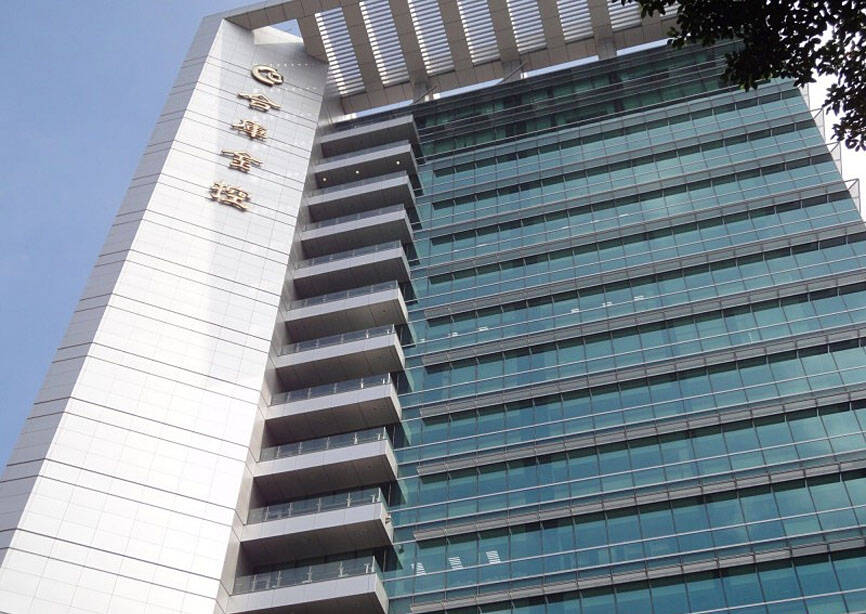State-run Taiwan Cooperative Financial Holding Co (合庫金控) yesterday said that it is looking at stable profit growth this year, as the improving economy at home and abroad would benefit core businesses and reverse loss-making overseas operations.
The bank-focused conglomerate gave the guidance during an online investors’ conference and said that economic scenes appear less murky, limiting the need for provisions.
Taiwan’s GDP growth this year is predicted to rise more than 3 percent, much faster than last year’s 1.32 percent.

Photo: Chen Mei-ying, Taipei Times
Net income last year totaled NT$17.88 billion (US$558.92 million), or earnings of NT$1.17 per share, company data showed.
The results represented declines of 14.12 percent and 15.22 percent from their levels in 2022, mainly due to provision costs for operations in Cambodia and elsewhere, Taiwan Cooperative Financial president Chen Mei-tsu (陳美足) said.
“Cambodia emerged from the pandemic in a slower-than-expected fashion,” prompting the lender to raise provision costs in the second and third quarters of last year to shore up its capital strength, officials said.
Things started to stabilize in the fourth quarter, when overseas operations squeezed a tiny profit, they said.
A string of rate hikes by the US Federal Reserve also pushed up funding costs more rapidly than the rise in interest income, officials added.
That explains why its main subsidiary, Taiwan Cooperative Bank (合作金庫銀行), last year saw its net income fall 14.95 percent to NT$16.3 billion, despite trading gains from financial products — including foreign exchange swaps — soaring nearly 200 percent.
Foreign exchange swaps generated more than NT$9 billion in profit, but might drop to NT$7.5 billion this year, they said.
This is due to Taiwan’s central bank last week unexpectedly raising interest rates by 0.125 percentage points and given that the US Federal Reserve might lower rates to support the US economy, officials added.
The narrowing difference between the interest rates of Taiwan and the US is unfavorable for swap revenue, officials said.
Even without the provision costs, Taiwan Cooperative Financial would record a net income increase of almost 20 percent, indicating that core businesses remain healthy, Chen said.
High funding costs also affected the results of Taiwan Cooperative Securities Co Ltd (合庫證券) and Taiwan Cooperative Bills Finance Corp (合庫票券), officials said.
In contrast, its venture capital and life insurance units saw robust improvement in their earnings ability, they added.
Taiwan Cooperative Financial said it plans to distribute a cash dividend of NT$0.65 per share and another stock dividend of NT$0.35 from last year’s net income, suggesting a payout ratio of 85 percent.
The plan is still pending approval from a shareholders’ meeting later this year.

TARIFFS: The global ‘panic atmosphere remains strong,’ and foreign investors have continued to sell their holdings since the start of the year, the Ministry of Finance said The government yesterday authorized the activation of its NT$500 billion (US$15.15 billion) National Stabilization Fund (NSF) to prop up the local stock market after two days of sharp falls in reaction to US President Donald Trump’s new import tariffs. The Ministry of Finance said in a statement after the market close that the steering committee of the fund had been given the go-ahead to intervene in the market to bolster Taiwanese shares in a time of crisis. The fund has been authorized to use its assets “to carry out market stabilization tasks as appropriate to maintain the stability of Taiwan’s

STEEP DECLINE: Yesterday’s drop was the third-steepest in its history, the steepest being Monday’s drop in the wake of the tariff announcement on Wednesday last week Taiwanese stocks continued their heavy sell-off yesterday, as concerns over US tariffs and unwinding of leveraged bets weighed on the market. The benchmark TAIEX plunged 1,068.19 points, or 5.79 percent, to 17,391.76, notching the biggest drop among Asian peers as it hit a 15-month low. The decline came even after the government on late Tuesday authorized the NT$500 billion (US$15.2 billion) National Stabilization Fund (國安基金) to step in to buoy the market amid investors’ worries over tariffs imposed by US President Donald Trump. Yesterday’s decline was the third-steepest in its history, trailing only the declines of 2,065.87 points on Monday and

TARIFF CONCERNS: The chipmaker cited global uncertainty from US tariffs and a weakening economic outlook, but said its Singapore expansion remains on track Vanguard International Semiconductor Corp (世界先進), a foundry service provider specializing in producing power management and display driver chips, yesterday withdrew its full-year revenue projection of moderate growth for this year, as escalating US tariff tensions raised uncertainty and concern about a potential economic recession. The Hsinchu-based chipmaker in February said revenues this year would grow mildly from last year based on improving supply chain inventory levels and market demand. At the time, it also anticipated gradual quarter revenue growth. However, the US’ sweeping tariff policy has upended the industry’s supply chains and weakened economic prospects for the world economy, it said. “Now

An employment discrimination lawsuit against contract chipmaker Taiwan Semiconductor Manufacturing Co (TSMC, 台積電) might soon be expanded after a hearing in a federal court in San Jose, California, on Tuesday to add 15 plaintiffs to the case. According to a court document, the lawsuit, which was refiled in November last year as a form of a class action with 13 plaintiffs in California, wants to add 15 plaintiffs from Arizona, where TSMC is building up its wafer fab capacity. TSMC first committed between 2020 and last year to invest US$65 billion in three advanced wafer fabs in Arizona. It then pledged an